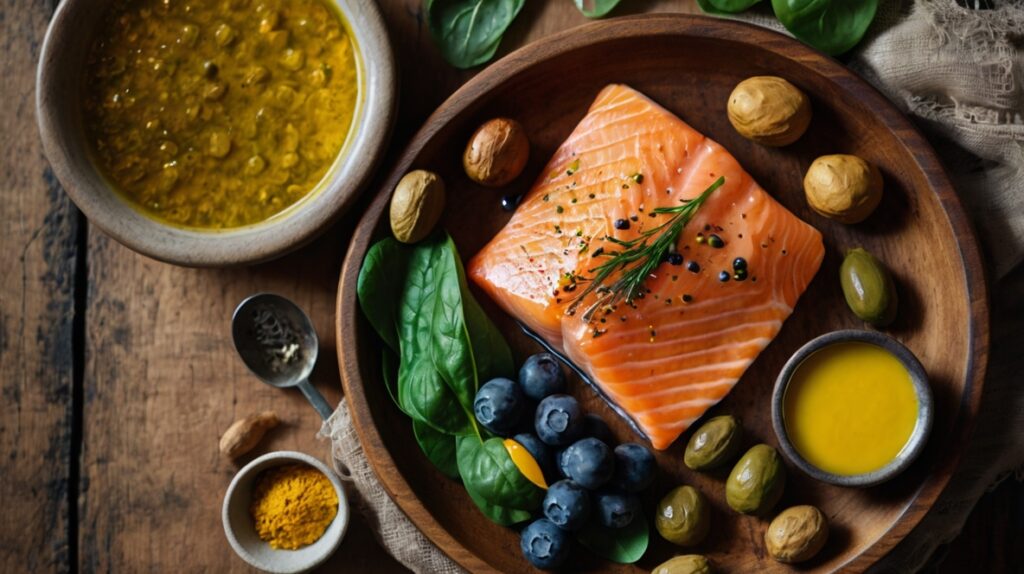How to Reduce Inflammation Naturally: A Complete Guide to Fight Chronic Inflammation
How to reduce inflammation naturally is one of the most common searches for those who want to improve health, prevent disease, and increase vitality.
Inflammation is a natural response of the body to injury, toxins, or infection.
However, when it becomes chronic, it can lead to conditions such as arthritis, diabetes, obesity, and cardiovascular disease.
Inflammation is one of the body’s natural defenses. It helps repair damaged tissues and fight infections.
But when this process becomes chronic, it no longer protects—it harms.
Chronic inflammation can silently trigger serious diseases without showing clear symptoms at first.
That’s why learning how to reduce inflammation naturally is not just helpful—it’s essential.
By making small daily choices, you can protect your cells, organs, and long-term vitality.
Anti-inflammatory foods that support your health
Diet plays a key role in controlling inflammation.
Certain foods contain bioactive compounds that help neutralize inflammatory processes in the body.
Add these anti-inflammatory foods to your diet:
Berries (strawberries, blueberries, blackberries): rich in antioxidants like anthocyanins.
Fatty fish (salmon, tuna, sardines): high in omega-3 fatty acids.
Dark leafy greens (spinach, kale, arugula): full of flavonoids and fiber.
Extra virgin olive oil: a source of oleic acid and polyphenols.
Turmeric (curcumin): contains curcumin, a powerful anti-inflammatory agent.
Ginger: helps relieve pain and joint inflammation.
These foods don’t just reduce inflammation; they actively support the body’s healing processes.
For example, omega-3 fats from fish help regulate immune responses.
Berries and leafy greens contain phytonutrients that protect your DNA.
Even herbs and spices, like garlic, cinnamon, and rosemary, can contribute to a healthier inflammatory balance.
Try including a mix of these foods in every meal to support natural recovery.

Eating these foods regularly is one of the most effective ways to learn how to reduce inflammation naturally.
Powerful anti-inflammatory teas
Besides food, certain natural drinks can help reduce inflammation in the body.
Best teas for inflammation:
Ginger tea: supports digestion and reduces inflammation.
Green tea: rich in catechins, boosts metabolism and fights free radicals.
Turmeric tea with black pepper: enhances curcumin absorption.
Chamomile or peppermint tea: promotes relaxation and stress relief.
Drink 2 to 3 cups per day to feel the benefits.
Daily habits that reduce inflammation
Some lifestyle habits are essential to reduce silent inflammation and strengthen your immune system.
Here’s what to include in your daily routine:
Get quality sleep: at least 7–8 hours per night.
Exercise regularly: walking, strength training, and yoga are excellent.
Stay hydrated: drink enough water to flush out toxins.
Manage stress: practice meditation, deep breathing, or take breaks.
Avoid alcohol and smoking: both trigger inflammation.
Research shows that stress is one of the biggest drivers of long-term inflammation.
It increases levels of cortisol and other hormones that strain your immune system.
That’s why meditation and deep breathing aren’t luxuries—they’re anti-inflammatory tools.
Likewise, moving your body daily, even with a short walk, reduces inflammatory markers in the blood.
Good habits amplify the effects of a healthy diet and speed up the healing process.

These practices are key if you want to understand how to reduce inflammation naturally in a sustainable way.
What to avoid to prevent inflammation
Just as important as what to include is knowing what to avoid.
Some foods and behaviors actively fuel inflammation and should be limited.
Avoid or reduce:
Ultra-processed foods (snacks, deli meats, sodas)
Excessive sugar
Refined flours
Trans fats and processed vegetable oils
Sedentary lifestyle
Overexposure to screens and lack of outdoor time
Simple tips to apply every day
Start your morning with a green juice or turmeric tea.
Replace white bread with whole grain or gluten-free options.
Use olive oil as your main dressing.
Add fresh ginger to juices and meals.
Stretch or go for a short walk daily.
These small changes can make a big difference in your path to reduce inflammation naturally.
FAQs: How to Reduce Inflammation Naturally
1. Can inflammation be reduced without medication?
Yes, in many cases. By improving your diet, sleep, hydration, and stress levels, your body can naturally regulate inflammation. However, chronic or severe inflammation may require medical attention.
2. How long does it take to notice improvements?
You may begin to feel better within a few days to a few weeks after making consistent lifestyle changes. The timeline depends on your overall health and the severity of the inflammation.
3. Are anti-inflammatory supplements effective?
Some supplements like curcumin, fish oil, and magnesium have scientific support. However, whole foods are usually better absorbed by the body and offer more long-term benefits.
4. Can exercise reduce inflammation?
Absolutely. Moderate exercise helps lower inflammation markers, improves circulation, and boosts immune function. The key is consistency, not intensity.
5. What should I avoid completely?
Sugary drinks, fried foods, alcohol, smoking, and processed meats are top contributors to inflammation and should be minimized or eliminated.
Conclusion: control inflammation before it controls your health
Chronic inflammation is a silent enemy to your health.
By eating the right foods, improving sleep, and adopting better daily choices, you can keep it under control — naturally and effectively.
Now is the time to invest in long-term wellness.
Want more content like this?
Visit our health articles at:
👉 Global Health Guide Blog
External resource:
Want to dive deeper into anti-inflammatory foods? Check out this article from Harvard Medical School:
👉 Foods that fight inflammation


No responses yet